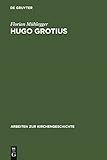Hugo Grotius : Ein christlicher Humanist in politischer Verantwortung / Florian Mühlegger.
Material type: TextSeries: Arbeiten zur Kirchengeschichte ; 103Publisher: Berlin ; Boston : De Gruyter, [2012]Copyright date: ©2007Description: 1 online resource (546 p.)Content type:
TextSeries: Arbeiten zur Kirchengeschichte ; 103Publisher: Berlin ; Boston : De Gruyter, [2012]Copyright date: ©2007Description: 1 online resource (546 p.)Content type: - 9783110199567
- 9783110894134
- 344.096092 22
- BR350.G7 M84 2007eb
- online - DeGruyter
- Issued also in print.
| Item type | Current library | Call number | URL | Status | Notes | Barcode | |
|---|---|---|---|---|---|---|---|
 eBook
eBook
|
Biblioteca "Angelicum" Pont. Univ. S.Tommaso d'Aquino Nuvola online | online - DeGruyter (Browse shelf(Opens below)) | Online access | Not for loan (Accesso limitato) | Accesso per gli utenti autorizzati / Access for authorized users | (dgr)9783110894134 |
Dissertation LMU München 2005.
i-iv -- Vorwort -- Inhaltsverzeichnis -- Einführung -- 1. Kapitel: Die bisherige Forschung zu Hugo Grotius als Theologen -- 2. Kapitel: Meletius -- 3. Kapitel: Ordinum Pietas -- 4. Kapitel: Defensio fidei catholicae de satisfactione -- 5. Kapitel: Decretum illustrium ac potentum ordinum -- 6. Kapitel: Oratio in Senatu Amstelredamensi habita -- 7. Kapitel: De imperio summarum potestatum circa sacra -- 8. Kapitel: Zusammenfassung und Ausblick -- Literaturverzeichnis -- Abkürzungsverzeichnis -- Namensregister -- Sachregister -- Verweise auf Grotius’ Werke
restricted access online access with authorization star
http://purl.org/coar/access_right/c_16ec
Die Münchner Dissertation untersucht auf der Grundlage der frühen theologischen und staatskirchenrechtlichen Schriften Hugo Grotius’ dessen theologische Positionierung und Argumentationsstrategien im Arminianischen Streit und den politischen Auseinandersetzungen Anfang des 17. Jahrhunderts – einer Zeit, in der Grotius in verschiedenen Positionen für die Staaten von Holland tätig war. Besonderer Wert wurde darauf gelegt, die Äußerungen Grotius’ vor dem Hintergrund der zeitgenössischen Politik zu lesen. Grotius wird hier als christlicher Humanist verstanden, der mit Hilfe raffinierter Leserlenkung die Bedeutung der Streitgegenstände herabsetzt. Auf der Grundlage eines Konsenses in Grundwahrheiten ruft er die Konfliktparteien zu gegenseitiger Toleranz auf. Für die weltliche Obrigkeit begründet er das Recht, in religiöse Streitigkeiten kraft ihrer staatlichen Autorität einzugreifen, um ein Auseinanderbrechen der gesellschaftlichen Einheit an Religionsfragen zu verhindern.
This thesis presented to the University of Munich uses early theological, legal and political writings by Hugo Grotius to determine his political position and the argumentative strategies he deployed in the Arminianic controversy and the political conflicts at the beginning of the 17th century. Particular value is attached to a reading of Grotius’ statements in the context of contemporary politics. As a Christian humanist, he moderated the various points at issue and appealed to the warring factions to exercise tolerance and seek reconciliation.
Issued also in print.
Mode of access: Internet via World Wide Web.
In German.
Description based on online resource; title from PDF title page (publisher's Web site, viewed 28. Feb 2023)


